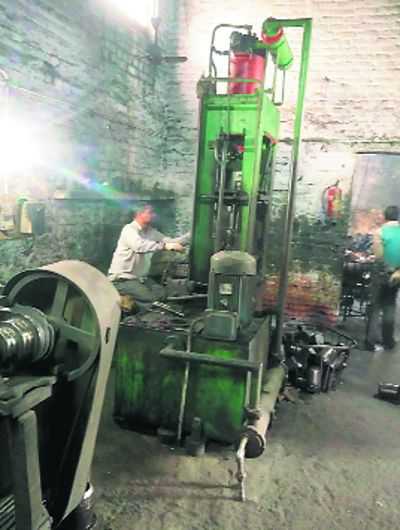Shiv Kumar Sharma
The metal industry in Jagadhri city is struggling to stay afloat. The lack of support from the state government and poor infrastructure facilities in the region have hindered the growth of the industry.
Jagadhri has around 1,500 micro, small and medium metal units manufacturing utensils of stainless steel, aluminum, brass and copper.
But this century-old industry is getting a stiff competition from the metal industries of Rajasthan and Gujarat, as their state governments are providing a number of facilities, including cheaper electricity and land at low rates, to them.
Dikshant, a young industrialist who is also the manager at the Manakpur Industrial Welfare Association, says that the utensil manufacturers of Rajasthan get tax rebates that helped their businesses to grow.
He says that 12 per cent Goods and Service Tax (GST) on simple utensils is high; it should be reduced as most of the buyers of these utensils, mainly made of stainless steel and aluminum, are common people.
Dikshant says that people of the upper class buy mostly fancy utensils and they can also afford to pay higher tax. “The government should reduce the GST on simple utensils from 12 per cent to 5 per cent,” he adds.
Darshan Lal Khera, owner of a metal factory, says that electricity in Haryana is costlier than in Rajasthan and Gujarat. “The Rajasthan and Gujarat governments are providing electricity at cheaper rates to their industries. However, our government is providing electricity at the rate of about Rs 11 per unit to the industries in the state,” he adds.
He says that the Haryana Government should reduce the electricity rates and provide loans without interest or at lower rates to micro, small and medium industrial units for installing solar power projects.
Khera adds that the government should follow the policies of the Rajasthan and Gujarat governments and provide land at cheaper rates for setting up new industrial units.
Sunder Lal Batra, general secretary of the Jagadhri Metal Manufacturers and Suppliers Association, says that several units in Jagadhri are on the verge of closure due to a stiff competition from the metal industries of Rajasthan, Gujarat, Maharashtra and Tamil Nadu.
“The metal industry of Jagadhri is not able to fight the competition from the metal industries of other states. Our cost of production is higher due to costlier electricity and other reasons. Therefore, our market share is continuously reducing. But the metal industries of others states like Rajasthan and Gujarat are growing and producing utensils at cheaper rates due to various facilities provided by their governments,” says Batra.
He adds, “The Haryana Government should come forward to save the century-old metal industry of Jagadhri by reducing electricity rates and providing other facilities to it”.
Batra says that the government should develop new industrial areas and provide land to the industry at lower rates.
Dikshant says that they are facing a major shortage of skilled manpower and therefore the government should introduce trades and courses in industrial training institutes (ITIs) to cater to the needs of the metal industry.
Khera adds that initially all utensils in the industry were made by hands. But after Independence in 1947, the metal industry of Jagadhri gradually adopted latest machines to manufacture products.
“With the passing of time, the taste of consumers changed and industrialists also shifted their focus from brass utensils to steel utensils,” says Khera.
The metal industry of Jagadhri is not able to fight the competition from the metal industries of other states. Our cost of production is higher due to costlier electricity and other reasons. Therefore, our market share is continuously reducing. But the metal industries of others states like Rajasthan and Gujarat are growing and producing utensils at cheaper rates due to various facilities provided by their governments. —Sunder Lal Batra, general secretary of Jagadhri Metal Manufacturers and Suppliers Association
The Rajasthan and Gujarat governments are providing electricity at cheaper rates to their industries. However, our government is providing electricity at the rate of about Rs 11 per unit to the industries in the state. —Darshan Lal Khera, a metal factory owner
Unlock Exclusive Insights with The Tribune Premium
Take your experience further with Premium access.
Thought-provoking Opinions, Expert Analysis, In-depth Insights and other Member Only Benefits
Already a Member? Sign In Now











